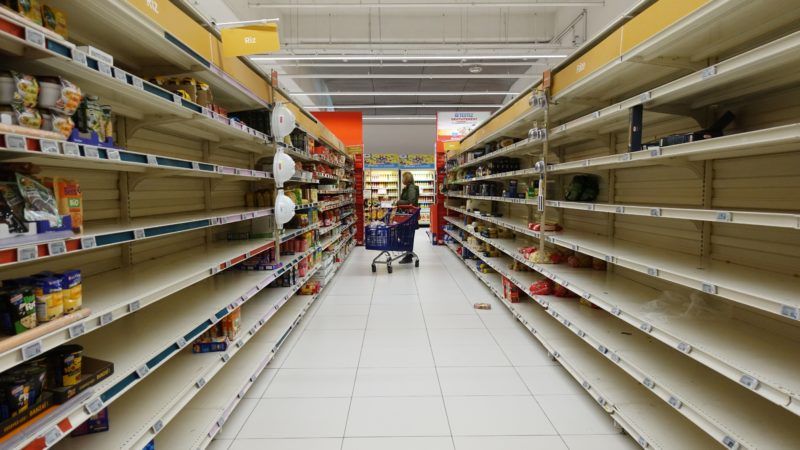To Avoid Charges of Price Gouging, eBay Bans Sale of Coronavirus Supplies
Attempts to impose low prices on emergency supplies often do far more harm than good.

Another year, another disaster, another economically misguided tug of war over the merits of "price gouging." The arrival of COVID-19, otherwise known as coronavirus, ushered in a predictable boost in prices for essential goods, as well as well-intentioned but ill-advised government attempts to cap what businesses can charge for those items. Such measures certainly leave an impact: eBay, for example, responded to that pressure yesterday, announcing that it would leave the market entirely and pull all coronavirus-related supplies from its virtual stores.
"As you may have noted, we are seeing literally small hand sanitizers like this going for as much as $17," said California Governor Gavin Newsom, a Democrat, calling the widespread price increases in the state "unconscionable" and "usurious." Violators in Newsom's jurisdiction face up to a $10,000 fine and a year in jail. Sen. Ed Markey (D–Mass.) specifically turned to Amazon: While the company and the suppliers it works with "have a right to expect a reasonable return on the products they sell," he wrote in a letter to CEO Jeff Bezos, "they do not have a right to impose unjustifiably high prices on consumers who are seeking to protect themselves against the coronavirus."
The immediate implications are alarming: How can a private business owner be subject to crippling fines (or even imprisonment) for setting his or her own prices? Yet that question misses the full point. It fails to address that prices responding to the market—as they tend to do—is a good thing, even in the face of a deadly pandemic.
Accusations of greed hurdled toward price-gouging business owners are understandable, particularly when people are suffering. But compare that with a world of government-imposed price caps. Those ceilings force businesses to sell in-demand goods at artificially low prices, which fail to signal that said goods are scarce. Absent that marker, supplies are then quickly exhausted, depriving many vulnerable people of the ability to get their hands on any.
Though most critics claim price-gougers are the ones depriving needy people of important goods, that's rarely true in practice. Consider this hypothetical: Businesses across the state of California (a nod to Newsom) opt to not raise prices on hand sanitizer, greatly increasing the likelihood that a small cohort of people concerned about coronavirus will buy a large share of the item in bulk. Since there is a limited supply of hand sanitizer in the marketplace, the immobile elderly woman next door who hadn't yet made her assisted sojourn to CVS is basically out of luck. And, in this case, she is more at risk of succumbing to the disease, should she contract it.
Perhaps worst of all, regulatory restrictions on pricing can, in some cases, force third-party sellers to exit the market entirely, as seen with eBay. Though it sounds like a doomsday scenario, it's exactly what the retail giant chose to do yesterday when it began pulling all surgical face masks, hand sanitizers, and disinfectant wipes, opting not to go head-to-head with the 34 states that have strict price-gouging regulations. While the consequences vary across the U.S., the liabilities clearly outweighed the risk of selling vital goods.
"We will continue to monitor the evolving situation and quickly remove any listing that mentions COVID-19, coronavirus, 2019nCoV (except books) in the title or description," the company wrote in a blog post. "These listings may violate applicable US laws or regulations, eBay policies, and exhibit unfair pricing behavior for our buyers."
This is quite literally why we can't have nice things.


Show Comments (61)